My flight from Cairo, Egypt to Manama, Bahrain in the summer of 1993 was memorable for four reasons: (1) Never have I been in such a cramped airplane, (2) there were no smoking restrictions whatsoever, (3) we had a 30-minute layover in Doha, Qatar (due to host the World Cup soccer tourney in 2022), and (4) one woman wore an all-black burqa which included a thick leather mask.
A man in a flowing white thobe, an assistant to Dr. Safia Dowaigher, greeted me at the airport. I was there to interview her for my book Coming to Texas / International Students at the University of Texas. My Cairo visit was for the same purpose, and the interviewee had been OPEC co-founder Abdullah Tariki. Dr. Dowaigher had kindly arranged a hotel room for me in Manama, capital of the island country.
There we were in the heart of the Middle East, me a male foreigner and she a female Mohammedan, sitting at her kitchen table chatting. Dr. Dowaigher (who earned a doctorate in educational administration at UT in 1985) wore no veil and certainly not a burqa. Her husband did not object. In fact, he made an effort to absent himself from the premises. I had a long list of questions and topics to discuss, and we went through 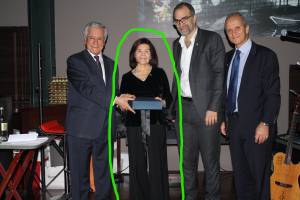 them methodically. The articulate Dr. Dowaigher related her impressive life story with ease. She was proud of Bahrain’s role as an educational leader in the Middle East, especially for girls and women. “Bahrain,” she said, “was on the map.”
them methodically. The articulate Dr. Dowaigher related her impressive life story with ease. She was proud of Bahrain’s role as an educational leader in the Middle East, especially for girls and women. “Bahrain,” she said, “was on the map.”
Our talks would have to be temporarily halted, she told me, because of Ashura, the tenth day in the month of Muharram. Her further explications went in one ear and out the other. As a Christian, I neither knew nor cared about the detailed reasons for the split between Sunnis and Shi’ites. A brief version goes like this: Shi’ites believe that Ali ibn Abi Talib, the cousin and son-in-law of the “prophet” Muhammad, was his rightful immediate successor. Since Ali was assassinated in 660, Muhammad’s grandson, al-Husayn ibn Ali ibn Abi Talib, then should have gotten the coveted position of imam. He was killed in the Battle of 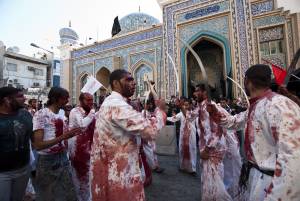 Karbala in 680. Husayn’s death was decisive in shaping Mohammedan and Shi’a history. Minority Mohammedans, they hold that the Ummayads (essentially the Sunnis) had oppressed them and violated “Allah’s” dictates, as set forth in the holy book Quran. Bahrain was and still is a predominantly Shi’ite country, although the al-Khalifa royal family is Sunni.
Karbala in 680. Husayn’s death was decisive in shaping Mohammedan and Shi’a history. Minority Mohammedans, they hold that the Ummayads (essentially the Sunnis) had oppressed them and violated “Allah’s” dictates, as set forth in the holy book Quran. Bahrain was and still is a predominantly Shi’ite country, although the al-Khalifa royal family is Sunni.
Oblivious to all this 27 years ago, I only knew that I had a whole day in which to look around Manama. Dr. Dowaigher’s son had arranged for me to take a two-hour guided tour in an open-air bus. If I had not come during Ashura, I would have missed out on a strange and startling scene. I saw hundreds of young men in the streets, all wearing white shirts, and all covered in blood from head to waist. They got that way by using cords and chains to whip themselves over one shoulder and then the other. It was done slowly and rhythmically, as they chanted slogans and drums were beaten.
This hyper-macho blood-letting ritual is called tatbir, and faithful Shi’ites say they do it in compassion for Ali and Husayn. Sunnis insist it is haram (forbidden), and even some Shi’ites would like to see it 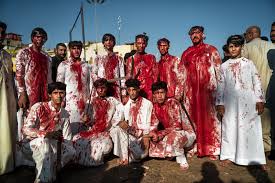 stop. An admirable display of faith, tatbir is nonetheless barbaric. The men are quite public, going from a hussainiya (a Shi’ite congregation hall) through the streets and finally back to a hussainiya, where they offer prayers. Scars are worn as a badge of pride.
stop. An admirable display of faith, tatbir is nonetheless barbaric. The men are quite public, going from a hussainiya (a Shi’ite congregation hall) through the streets and finally back to a hussainiya, where they offer prayers. Scars are worn as a badge of pride.
Regardless of growing disapprobation—Iran’s Ayatollah Khamenei recently issued a fatwa against it—tatbir goes on during Ashura in Manama; in Tehran; in Baghdad; in Karachi; in Istanbul; in Yangan, Myanmar; in Sana’a, Yemen; in Baku, Azerbaijan; in Nabatieh, Lebanon; and elsewhere. There is another, even more ominous, form of tatbir in which people strike themselves on the forehead with the blunt edge of a sword; this is not what I saw in Manama.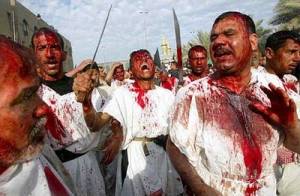
You can imagine how I gaped at these guys. Some Ashura participants, I read, faint from loss of blood and must be carried off to the nearest hospital. I expected these Bahrainis to be dazed and weary from hours of self-flagellation, but each one seemed alert.
I was back at Dr. Dowaigher’s house the next day, and of course I told her what I had witnessed. I tried not to convey the horror and disgust I had felt upon seeing those bloodied heads and torsos. Unsurprised and unworried about my reaction, she calmly reiterated her earlier summary about Ashura but added new information about tatbir. We then carried on with our interview.

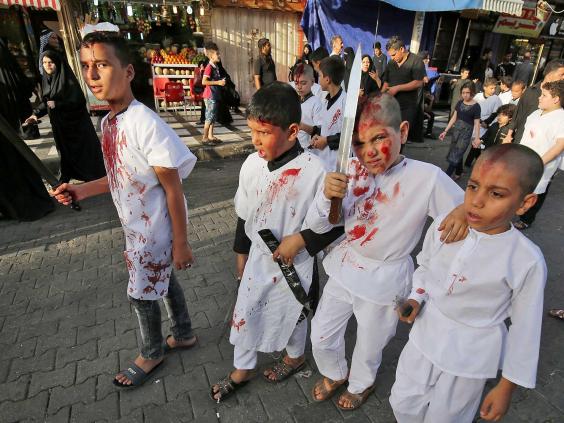
Add Comment